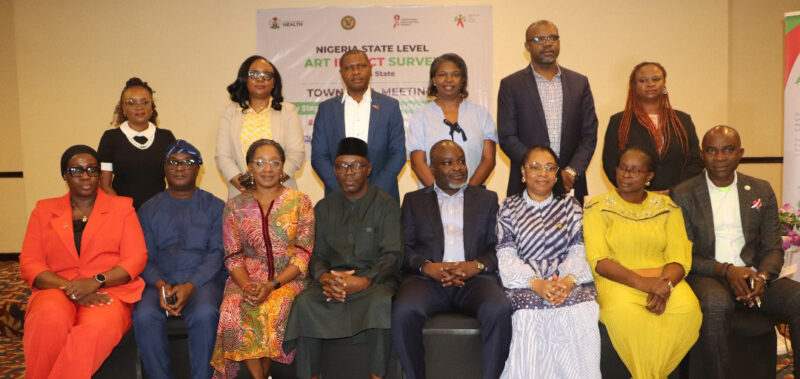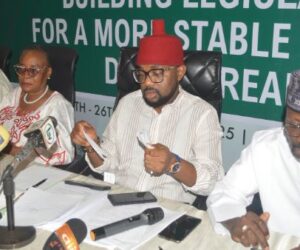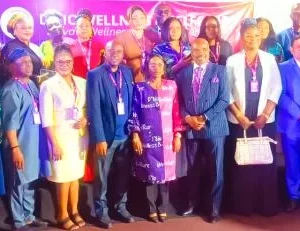1
… The Initiative Will Drive Evidence-Based Health Response, Treatment
LAGOS – The Lagos State Government, in partnership with the Federal Ministry of Health through the National AIDS and STIs Control Programme (NASCP), has officially launched the Nigeria State-Level Antiretroviral Therapy (ART) Impact Survey (AIS) in Lagos. The initiative is supported by national and international partners including the APIN-PHIS3 Project, PEPFAR, the U.S. Centres for Disease Control and Prevention (CDC), the National Agency for the Control of AIDS (NACA), and other stakeholders.
A town hall meeting held on Tuesday at the Sheraton Hotel in Ikeja brought together government officials, development partners, health professionals, and community leaders under the theme: *“Every Step Counts: Towards an HIV-Free Nigeria.”*
The survey aims to estimate HIV treatment coverage and viral load suppression among adults aged 15 to 64 years. It will span 205 Enumeration Areas, 6,150 households, and approximately 11,397 participants across the 20 Local Government Areas of Lagos State.
Declaring the meeting open, the Permanent Secretary of the Lagos State Ministry of Health, Dr Olusegun Ogboye, emphasised the importance of the survey in strengthening evidence-based planning for HIV response.
“This is an impact survey that will assess HIV prevalence, treatment coverage, and viral load suppression among adults in Lagos,” Dr Ogboye stated. “We count on the cooperation of communities, security agencies, and field workers to make it successful.”
He urged field workers to approach their tasks with diligence, noting, “Even though you are one individual in one community, the results you generate will shape national health planning. The success of this survey depends on every one of us.”
Dr Ibrahim Dalhatu, Deputy Director of Epidemiology and Strategic Information at the U.S. CDC, described the initiative as a people-centred activity, despite its scientific foundation.
“This is ultimately about people—the same people who will be engaged and who will benefit from the exercise,” he said. “The outcomes will guide important health decisions on HIV and other diseases for Lagos and Nigeria.”
He reaffirmed the CDC’s commitment to providing technical support, stressing that stakeholders must facilitate access for field workers and ensure community acceptance to guarantee credible results.
Representing the National Coordinator of NASCP, Dr Adebola Bashorun, Deputy Director of Prevention at NASCP, Dr Chioma Ukanwa, described the AIS as a globally recognised exercise vital to epidemic control.
“The survey will reach homes, communities and local governments, providing a true picture of the HIV situation,” Dr Ukanwa noted. “We need reliable data to make informed decisions and improve healthcare outcomes.”
She called on community leaders to sensitise members, emphasising that cooperation with data collectors would determine the success of the survey.
Mr Francis Agbo, Director of Research Monitoring and Evaluation at NACA, said the survey presents an opportunity to track progress towards HIV epidemic control in Lagos.
“We have just concluded a similar exercise in Akwa Ibom, and Lagos is the next frontier,” he said. “The indicators will help us plan for the future.”
Dr Williams Nwachukwu, Deputy Director of the Department of Surveillance at the Nigeria Centre for Disease Control (NCDC), assured stakeholders of NCDC’s technical support in ensuring quality data collection and analysis.
“We are here to ensure that data and samples are properly preserved, tested, and analysed with feedback provided,” he said.
Similarly, Dr Dare Onimode, Project Director of the APIN-PHIS3 Project, described the town hall as another milestone in Nigeria’s fight against HIV.
“This meeting provides the opportunity to seek your support for the process. The progress made so far is due to the invaluable backing of stakeholders,” he remarked.
Delivering a goodwill message, Mr Patric Akpan, representative of the Network of People Living with HIV/AIDS in Nigeria (NEPWHAN), pledged community support for the survey.
“It is essential to generate accurate data because reliable data from Lagos will inform sound policy decisions for Nigeria,” he said.
Dr Victoria Egunjobi, Director of Disease Control at the Lagos State Ministry of Health, underscored the need for community trust and participation to ensure credible outcomes.
“Gone are the days when HIV was shrouded in stigma. Today, people living with HIV deserve dignity, respect and universal access to healthcare,” she said. “This survey is about evaluating progress and closing gaps.”
In his presentation on the Community Mobilisation and Advocacy Strategy of the Survey, Dr Oladipupo Fisher, Lagos State AIDS Programme Coordinator, explained that the ART Impact Survey would rely heavily on grassroots participation to succeed. He reiterated that the survey, covering 205 randomly selected Enumeration Areas with about 6,150 households and an estimated 11,000 participants, would deploy 30 survey teams supported by mobilisers tasked with sensitising communities.
Dr Fisher emphasised that community mobilisation was crucial to creating awareness, building trust, and encouraging participation. “The mobilisation process will be done in three phases—before, during and after data collection—using strategies such as poster placement, town hall meetings, door-to-door visits, and targeted outreach to selected households,” he explained.
He noted that mobilisers would also schedule appointments, respond to questions, and monitor perceptions to dispel myths about HIV testing. Highlighting their roles, he said mobilisers would distribute brochures, engage in group and individual conversations, and ensure households were available for the survey.
“Our aim is to saturate the communities with AIS messages, foster understanding of the survey’s purpose, and ensure households cooperate with field workers,” Dr Fisher said, adding that the exercise would adapt strategies to the unique needs of each Lagos community.
The Nigeria State-Level AIS is supported by PEPFAR, the U.S. CDC, NACA, NCDC, APIN Public Health Initiatives, LSACA and other implementing partners. It is expected to provide the most reliable state-level data for HIV planning in Lagos.








